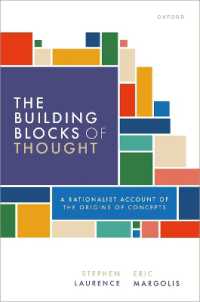Full Description
Bringing together research from the fields of linguistics, education and technology within the dynamic context of South Asia, this timely book investigates the ways in which these fields interact with each other against the backdrop of technological innovation, linguistic diversity and socio-political transformation.
Developing and expanding on findings and insights originating from a conference organised by the Education South Asia Initiative at the University of Oxford, this interdisciplinary book features academic reflections on language politics and diversity as well as empirical insights on linguistic, educational and technological transformations in the region. Featuring analytical and methodological approaches to the study of language and education, chapters range in context from India, Bangladesh, Nepal, Pakistan and Sri Lanka, and address a range of issues such as the marginalisation of languages in education and policy, the interactions between language and social hierarchies in the South Asian context, and technology's impact on language education, acquisition, usage and preservation.
Ultimately initiating dialogue on the need for positive changes in language, education research and policy, this book will appeal to scholars, researchers and postgraduate students in the fields of language education, international and comparative education, and education and technology. Policymakers in international development and sociolinguistics may also find the volume of use.
The Open Access version of this book, available at http://www.taylorfrancis.com, has been made available under a Creative Commons Attribution-Non Commercial-No Derivatives (CC BY-NC-ND) 4.0 license.
Contents
Introduction: Language and Education Futures in South Asia
Part I: Language and Politics
Chapter 1 - Youth Perspectives on Hindi, English and India's New Politics of Language: Becoming Bharat
Chapter 2 - Language Textbooks as a Site of Conflict in India: The Phenomenon of 'Erased Curriculum'
Chapter 3 - The Challenges of Literacy Acquisition and Linguistic Proficiency in Multilingual Educational Landscape of Pakistan
Chapter 4 - Mother-tongue-based Education and Indian Teachers' views on Language Policy Reforms by the Bharatiya Janata Party
Chapter 5 - Unofficial Bilingualism in English-only Policy Context: A Postmethod Pedagogy for Difficult Circumstances in Rural Government Schools of Tamil Nadu
Part II: Language and Inclusivity
Chapter 6 - Kerala's Language Directive and the Erasure of Gendered Teacher Identities
Chapter 7 - Multilingualism and globalisation in remote trans-Himalayan India: How topography and place-experience impact language learning
Chapter 8 - Future of education in Bangladesh: Everyday politics of language between competition, integration, and modernisation
Chapter 9 - Language Documentation, Dialects, and Education among the Naawa of Nepal
Part III: Language and Technology
Chapter 10 - Indian Languages and Language Acquisition Apps: My Phone Won't Teach Me Malayalam
Chapter 11 - Remembering Nepal Bhasa through Artificial Intelligence (AI) Translations: Language, Technology and Indigenous Memory
Chapter 12 - Navigating the Pedagogical Implications of Digital Education in Bangladesh
Chapter 13 - Remote virtual teacher communities in Sri Lanka: Difficulties and possibilities








